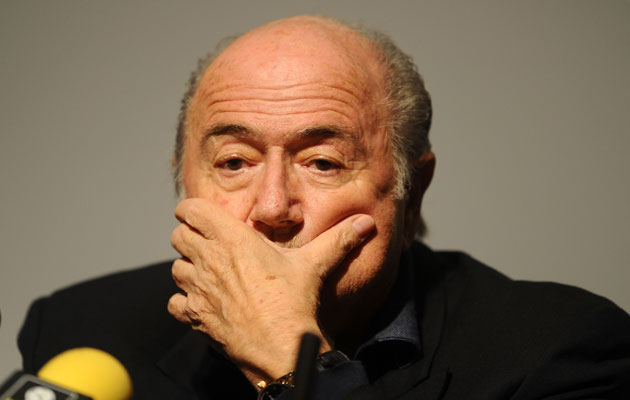FIFA is about to lay bare the greatest, most intriguing secret of all: exactly how much has Sepp Blatter been paid as president?
The world will finally know the truth if the reform package being presented to the world federation’s extraordinary congress is approved by at least 75pc of 209 national associations in Zurich next Friday.
Remuneration information for the president and senior officers in 2015 will be disclosed in the annual accounts to be presented to the ordinary congress in Mexico City in May. All that is needed is for the statutory 60 days to pass so that next week’s decisions take retrospective effect.
Pay clarity is one of the least important clauses of the reform package. However it has come to represent a touchstone for all the double-speak and evasion which has characterised the corrupt ‘confidentiality’ of the Blatter regime and turned ‘transparency’ into a dirty word.
Christian Constantin, the Sion president who is an old friend and confidant of Blatter, suggested last year that the president was being paid around €8m a year.
In one sense the sum itself is irrelevant: whether €8 or €800,000. What matters above all is that the game at large has both the right to know and the right to know the truth.
Television companies and sponsors whose billions fill FIFA’s World Cup coffers only possess such cash through revenue-generating subscriptions, advertising and (as in the case of the United Kingdom) the taxpayer . . . ie, from the pockets of the world’s football fans.
Greatest focus on the reform package has been on well-worn (almost lazy) headline issues such as remuneration, term limits and the evolution of the derided executive committee into a ‘strategic council’. But the real revolution is in a depth of detail which critics have largely ignored.
Alternatively, they consider FIFA already far beyond redemption and inevitably destined to crash and burn.
FIFA ambassadors have been working assiduously to ‘sell’ the reform message where it matters, among the national associations, to governance watchdogs and to politicians within both the European Union and Switzerland.
That critical thunderstorms still rain down upon Zurich demonstrates the vast sense of betrayal felt around the world, around the game.
It’s not that FIFA is the only international sports federation which acquiesced in a rotting culture of personal greed which ate it from within. Just look at the travails in recent years of cycling and athletics – and these are merely federations whose sports exist in the world media’s headline range.
Equally questionable may be practices within many of the other 40 or so sports associations who also constructed built their self-protective nests in cosy, regulation-lite Switzerland.
But football, as a sport, is greater than the sum of the all the rest put together. FIFA wields far more direct influence, for example, than the platitudinous International Olympic Committee which is less a governing body, rather a grandiose Games organiser.
The reform committee, chaired by former IOC director-general Francois Carrard, was heavily criticised – with just cause – because its membership comprised only two appointees from each of the six regional confederations whose obstructionism so frustrated original reform guru Mark Pieth.
But, in the end, this may work, conversely, to reformers’ advantage.
The reason is simple. The vast majority of reforms – aimed at switching commercial control from the politicians to the company staff, slashing the number of standing committees, bringing in a swathe of independent directors – are unobjectionable. They would earn their 75pc majority without delay.
However, one clause possesses the power to sink the entire package. This is the insistence that each and every national association, from Chile to China, England to Ecuador, must publish its independently audited accounts on an annual basis.
This will mean a massive sea change.
Last autumn Transparency International undertook a major survey of financial transparency across all the 209 national associations. Some 81pc of FAs had no financial records publicly available.
TI assessed all 209 across four basic sectors: publication of financial reports, organisation charter, annual activity reports and code of conduct/ethics. Only 14 of the 209 member FAs ticked all four boxes: Canada, Denmark, England, Hungary, Iceland, Italy, Japan, Latvia, New Zealand, Northern Ireland, Norway, Portugal, Rep. Ireland and Sweden.
Euro 2016 host France, Germany and 2018 World Cup host Russia all fell short in two categories. A massive 87 national associations – including 2022 World Cup host Qatar – failed all four tests. Some 42 FAs did not even have working websites.
In the past an insistence on audited accounts publication would never collect 25pc of the votes, never mind 75pc. Federations would rise up in anger at such an infringement of their independence by ‘head office’. But, this time, their confederations bosses, via the reform committee, have switched sides.
Also, context is everything.
The United States and Swiss judicial investigators currently grant FIFA ‘victim’ status. Thus means that the world federation is considered as having been significantly damaged by the unfettered greed of individuals such as Jack Warner, Jeffrey Webb, Nicolas Leoz, etc.
However . . . if FIFA Congress votes down the reforms then the perception of the body itself will be overturned from victim to criminal conspirator. That would bring it crashing down.
Football in powers such as England, France, Germany, Italy, Spain etc would continue unaffected. But the collapse of FIFA, with the loss of all those developments grants and subsidies, would spell ruin for possibly more than 100 of its minnow members.
This is why voting Yes to reform is not merely in the interests of FIFA but that of the member associations; far more important, even, than the identity of the next figurehead president.
Along the way they, too, may be curious to know how richly the last president rewarded himself for leading them all into this mess.







